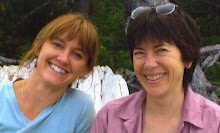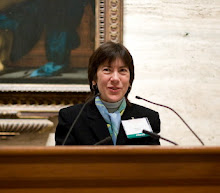Our shelf of eco-fiction is expanding. Here is a new list that includes suggestions from a few sources, including those who commented on the previous post:
Black Sun by Edward Abbey
Good News by Edward Abbey
The Monkey-Wrench Gang by Edward Abbey
Oryx and Crake by Margaret Atwood
Year of the Flood by Margaret Atwood
Surfacing by Margaret Atwood
The Windup Girl by Paolo Bacigalupi
Pump Six and Other Stories by Paolo Bacigalupi
Almost everything by Nevada Barr (Bittersweet, Blind Descent, Blood Lure, Deep South, Endangered Species, Firestorm, Flashback, Hard Truth, High Country, Hunting Season, Ill Wind, A Superior Death, Track of the Cat, Winter Study)
A Friend of the Earth by T.C. Boyle
Ecotopia by Ernest Callenbach
Looking for Peyton Place by Barbara Delinsky
Blackwater by Kerstin Ekman
The Lobo Outback Funeral Home by Dave Foreman
Everything by Carl Hiaasen (Basket Case, Double Whammy, Flush, Hoot, Lucky You, Sick Puppy, Skinny Dip, Stormy Weather, Tourist Season)
Dune by Frank Herbert, and all the Dune books
Many works by Tony Hillerman (e.g. The Fallen Man, The Wailing Wind, The Sinister Pig)
Prodigal Summer by Barbara Kingsolver
Purgatory Ridge by William Kent Krueger
The Dispossessed by Ursula K. LeGuin
The Call of the Wild by Jack London
The Road by Cormac McCarthy
Skyward by Mary Alice Monroe
The Beach House by Mary Alice Monroe
The Milagro Beanfield War by John Nichols
Woman on the Edge of Time by Marge Piercy
He, She, and It by Marge Piercy
Ishmael by Daniel Quinn
The Story of B by Daniel Quinn
Works by Elizabeth Quinn (e.g. A Wolf in Death's Clothing, Murder Most Grizzly)
Works by Kim Stanley Robinson (The Mars Trilogy: Red Mars, Blue Mars, Green Mars; Three Californias Trilogy: The Wild Shore, The Gold Coast, Pacific Edge; Forty Signs of Rain, Fifty Degrees Below, Sixty Days and Counting, Antarctica)
Alaska Dragon by Benjamin Shaine
Works by Dana Stabenow (e.g. Dead in the Water, Play with Fire)
Earth Abides by George R. Stewart
Grass by Sheri Tepper
Have anything more to add to the list? Once again, your comments are welcome!
Sunday, November 22, 2009
Friday, November 6, 2009
What is Eco-Fiction?
Last week, in the small directed study I teach at Finlandia University on Environmental Writing and Literature, we started a unit on eco-fiction. This is our third focus in the class; previously, we covered nature writing and then environmental journalism. Books we’ve read so far include Rachel Carson’s Silent Spring; Michael Pollan’s The Omnivore’s Dilemma; Refuge by Terry Tempest Williams; Stuff by John Ryan and Alan Durning; Bill McKibben’s Hope, Human and Wild; and Lisa Margonelli’s Oil on the Brain. We’ve also looked at nature essays and environmental journalism articles by various other authors.
 With eco-fiction, we began by attempting a definition. First, and most obviously, eco-fiction is fiction, i.e., not a true story. At its basis, though, is some sort of truth – an environmental truth. Whether it’s classic literature (say, Jack London’s Call of the Wild) or eco sci-fi (maybe Frank Herbert’s Dune or Ursula LeGuin’s The Dispossessed) it makes some sort of statement about the human relationship to the environment. It also in some way expresses concern for the non-human world, and/or human survival.
With eco-fiction, we began by attempting a definition. First, and most obviously, eco-fiction is fiction, i.e., not a true story. At its basis, though, is some sort of truth – an environmental truth. Whether it’s classic literature (say, Jack London’s Call of the Wild) or eco sci-fi (maybe Frank Herbert’s Dune or Ursula LeGuin’s The Dispossessed) it makes some sort of statement about the human relationship to the environment. It also in some way expresses concern for the non-human world, and/or human survival.
More could probably be said, but that’s what we have for our definition so far. Next, we looked at examples of eco-fiction. In class, we assembled a short bookshelf of some of the eco-fiction found in Finlandia’s library as well as in my own, including:
This is hardly an extensive list, but with this as a start, I’d like to build one. If you’re reading this, I have two questions for you:
1) What eco-fiction titles would you add to this list? (Conversely, is there anything above you might delete?)
2) What would you add to or change about our definition of eco-fiction?
Your comments are welcome!
 With eco-fiction, we began by attempting a definition. First, and most obviously, eco-fiction is fiction, i.e., not a true story. At its basis, though, is some sort of truth – an environmental truth. Whether it’s classic literature (say, Jack London’s Call of the Wild) or eco sci-fi (maybe Frank Herbert’s Dune or Ursula LeGuin’s The Dispossessed) it makes some sort of statement about the human relationship to the environment. It also in some way expresses concern for the non-human world, and/or human survival.
With eco-fiction, we began by attempting a definition. First, and most obviously, eco-fiction is fiction, i.e., not a true story. At its basis, though, is some sort of truth – an environmental truth. Whether it’s classic literature (say, Jack London’s Call of the Wild) or eco sci-fi (maybe Frank Herbert’s Dune or Ursula LeGuin’s The Dispossessed) it makes some sort of statement about the human relationship to the environment. It also in some way expresses concern for the non-human world, and/or human survival.More could probably be said, but that’s what we have for our definition so far. Next, we looked at examples of eco-fiction. In class, we assembled a short bookshelf of some of the eco-fiction found in Finlandia’s library as well as in my own, including:
- The Monkey-Wrench Gang by Edward Abbey
- Winter Study by Nevada Barr
- A Friend of the Earth by T.C. Boyle
- Ecotopia by Ernest Callenbach
- Looking for Peyton Place by Barbara Delinsky
- The Lobo Outback Funeral Home by Dave Foreman
- Flush by Carl Hiaasen
- Sick Puppy by Carl Hiaasen
- Skinny Dip by Carl Hiaasen
- Dune by Frank Herbert
- Prodigal Summer by Barbara Kingsolver
- The Dispossessed by Ursula K. LeGuin
- The Call of the Wild by Jack London
- Skywatch by Mary Alice Monroe
- The Milagro Beanfield War by John Nichols
- Ishmael by Daniel Quinn
This is hardly an extensive list, but with this as a start, I’d like to build one. If you’re reading this, I have two questions for you:
1) What eco-fiction titles would you add to this list? (Conversely, is there anything above you might delete?)
2) What would you add to or change about our definition of eco-fiction?
Your comments are welcome!
Subscribe to:
Posts (Atom)

